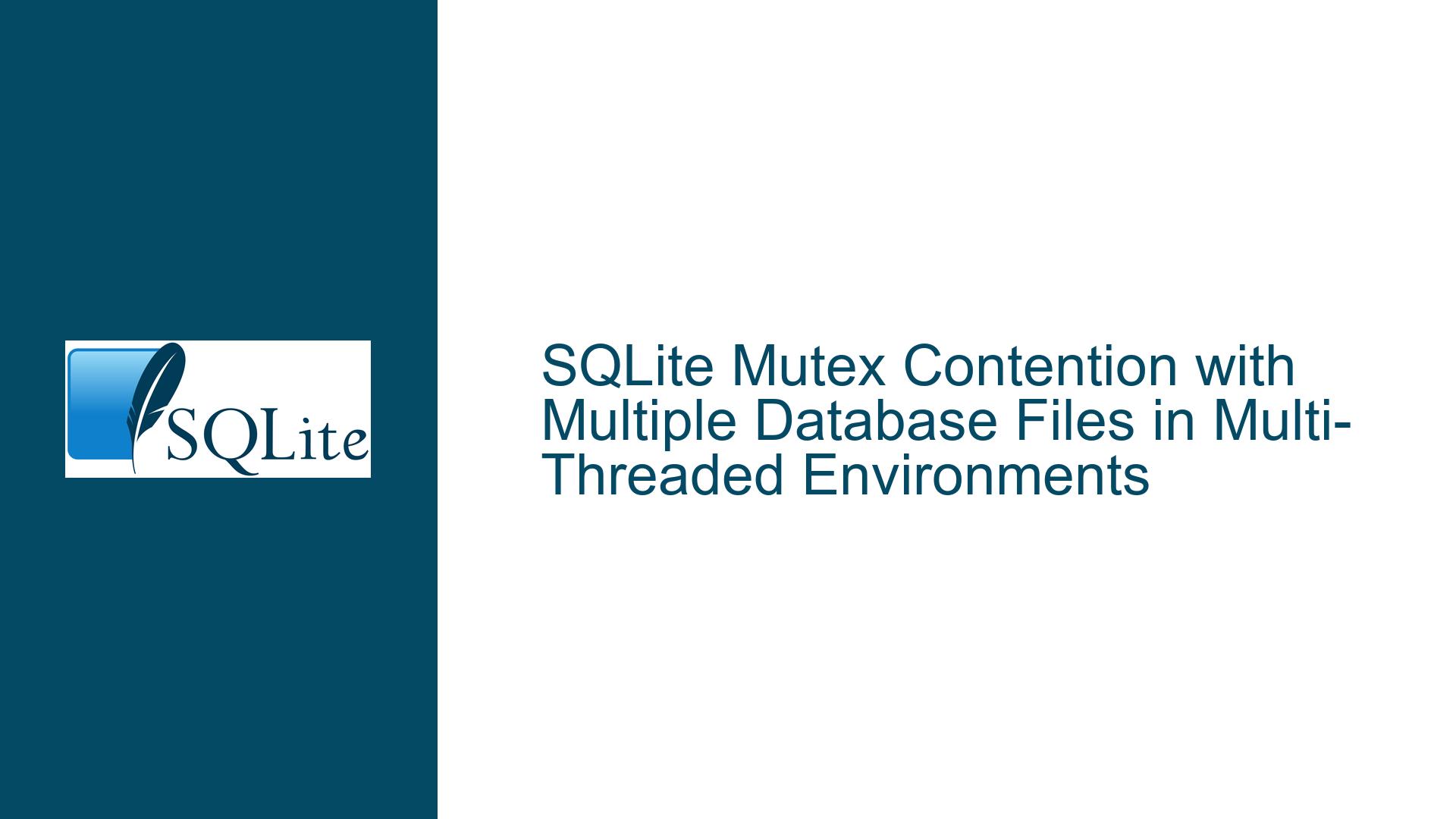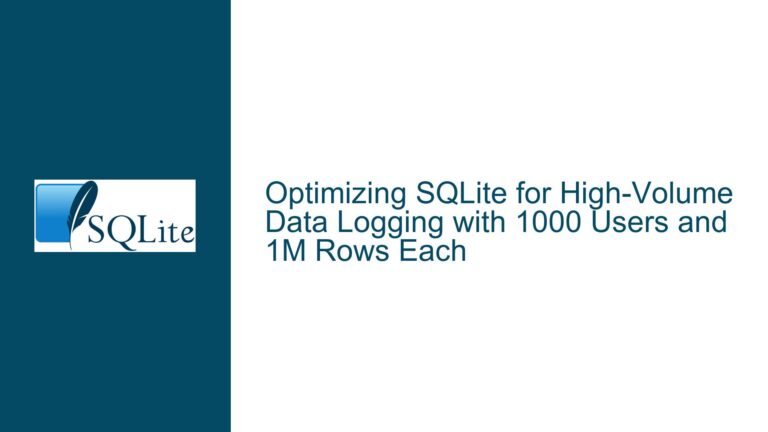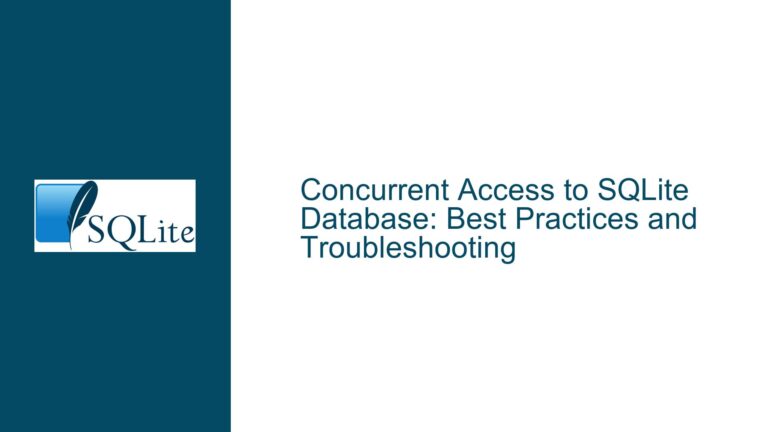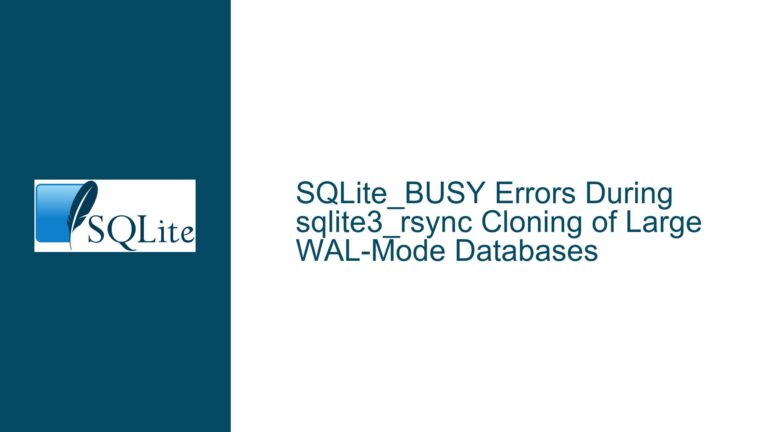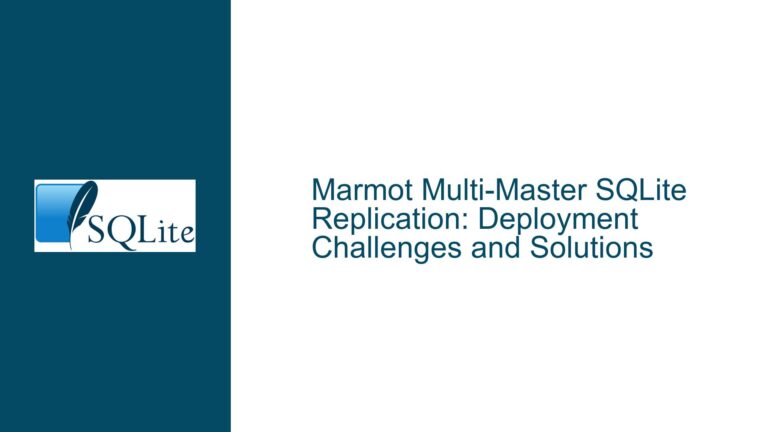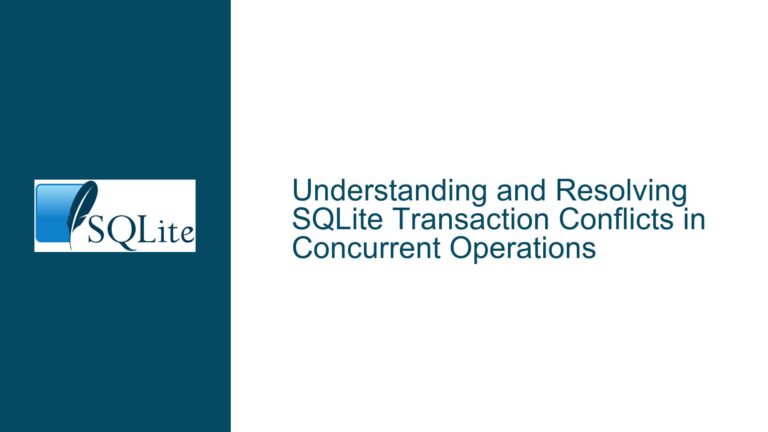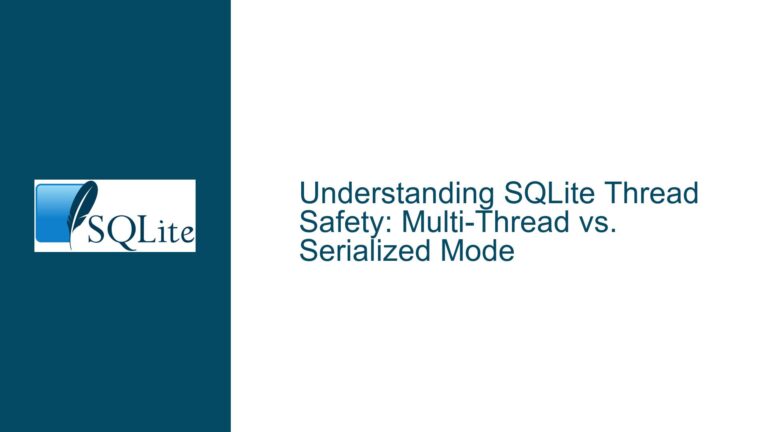SQLite Mutex Contention with Multiple Database Files in Multi-Threaded Environments
Understanding SQLite Mutex Behavior with Multiple Database Connections
SQLite is a lightweight, serverless, and self-contained database engine that is widely used in applications requiring embedded database functionality. One of its key features is its thread safety, which is achieved through the use of mutexes (mutual exclusion locks). These mutexes ensure that concurrent operations on the same database connection do not lead to data corruption or undefined behavior. However, when dealing with multiple database files in a multi-threaded environment, the behavior of these mutexes can become a source of confusion and contention.
In SQLite, each database connection (sqlite3 struct) is associated with its own set of mutexes. These mutexes protect the internal state of the connection and ensure that only one thread can execute certain operations at a time. However, there are scenarios where mutexes may appear to interfere across different database connections, particularly when operating on multiple database files within the same process. This issue often manifests in multi-threaded applications where threads access different database files but share the same SQLite library instance.
The core of the problem lies in the distinction between connection-specific mutexes and process-global mutexes. While most mutexes in SQLite are tied to individual connections, certain operations—particularly those involving file descriptors and inode data—may rely on process-global mutexes. This can lead to unexpected contention between threads operating on different database files, even though the connections themselves are independent.
To fully understand this behavior, it is essential to delve into the specifics of SQLite’s mutex implementation, particularly in the context of the Unix VFS (Virtual File System). The Unix VFS uses a process-global mutex called unixBigLock to protect shared resources such as inode data. This mutex is acquired during operations like findReusableFd, which is responsible for reusing file descriptors to avoid excessive file descriptor consumption. When multiple threads attempt to perform file-related operations simultaneously, they may contend for the unixBigLock, leading to performance bottlenecks or even deadlocks in extreme cases.
This issue is further complicated by the fact that the unixBigLock is primarily used in debug builds of SQLite. In production builds, the reliance on this mutex may be reduced or eliminated, depending on the configuration and compilation options. However, the presence of such a mutex in debug builds can still cause confusion during development and testing, as developers may observe behavior that does not align with their expectations based on the SQLite documentation.
In summary, the issue revolves around the interaction between connection-specific mutexes and process-global mutexes in SQLite. While connection-specific mutexes ensure thread safety for individual database connections, process-global mutexes like unixBigLock can introduce contention when multiple threads operate on different database files within the same process. Understanding this distinction is crucial for diagnosing and resolving mutex-related issues in multi-threaded SQLite applications.
Investigating the Role of unixBigLock in Mutex Contention
The unixBigLock mutex plays a pivotal role in SQLite’s thread safety mechanism, particularly in Unix-like operating systems. This mutex is designed to protect shared resources that are not tied to individual database connections, such as inode data and file descriptors. While its primary purpose is to ensure the integrity of these shared resources, its process-global nature can lead to contention in multi-threaded environments.
The unixBigLock mutex is acquired during operations that involve file descriptor management, such as opening, closing, or reusing file descriptors. For example, the findReusableFd function, which is responsible for finding and reusing file descriptors, acquires the unixBigLock before performing its operations. This ensures that only one thread can manipulate the shared file descriptor pool at a time, preventing race conditions and data corruption.
However, the process-global nature of unixBigLock means that it can become a bottleneck when multiple threads attempt to perform file-related operations simultaneously. Even if these threads are operating on different database files, they may still contend for the unixBigLock, leading to reduced performance and potential deadlocks. This behavior is particularly problematic in applications that rely heavily on concurrent database operations, such as web servers or real-time data processing systems.
The issue is further exacerbated by the fact that unixBigLock is primarily used in debug builds of SQLite. In production builds, the reliance on this mutex may be reduced or eliminated, depending on the configuration and compilation options. However, the presence of unixBigLock in debug builds can still cause confusion during development and testing, as developers may observe behavior that does not align with their expectations based on the SQLite documentation.
To mitigate the impact of unixBigLock contention, it is essential to understand the specific scenarios in which this mutex is acquired. For example, operations that involve opening or closing database files are more likely to contend for unixBigLock than operations that involve reading or writing data. By minimizing the frequency of these operations or optimizing their implementation, developers can reduce the likelihood of contention and improve the overall performance of their applications.
In addition to unixBigLock, SQLite also uses other process-global mutexes to protect shared resources. For example, the winBigLock mutex serves a similar purpose in Windows environments. However, the behavior of these mutexes may differ depending on the operating system and the specific implementation of the SQLite library. As such, developers must be aware of the platform-specific nuances when diagnosing and resolving mutex-related issues.
In summary, the unixBigLock mutex is a critical component of SQLite’s thread safety mechanism, but its process-global nature can lead to contention in multi-threaded environments. By understanding the specific scenarios in which this mutex is acquired and optimizing the implementation of file-related operations, developers can mitigate the impact of contention and improve the performance of their applications.
Resolving Mutex Contention in Multi-Threaded SQLite Applications
Resolving mutex contention in multi-threaded SQLite applications requires a combination of careful design, optimization, and platform-specific considerations. The following steps outline a comprehensive approach to diagnosing and addressing mutex-related issues, particularly those involving process-global mutexes like unixBigLock.
1. Minimize File-Related Operations:
One of the most effective ways to reduce contention for unixBigLock is to minimize the frequency of file-related operations, such as opening and closing database files. Instead of repeatedly opening and closing the same database file, consider maintaining a pool of open database connections that can be reused across multiple operations. This approach not only reduces contention for unixBigLock but also improves the overall performance of the application by minimizing the overhead associated with file operations.
2. Optimize File Descriptor Management:
The findReusableFd function, which is responsible for finding and reusing file descriptors, is a common source of contention for unixBigLock. To mitigate this issue, consider implementing a custom file descriptor management strategy that reduces the reliance on findReusableFd. For example, you could preallocate a pool of file descriptors at application startup and manage their lifecycle independently of SQLite’s internal mechanisms. This approach can significantly reduce contention for unixBigLock and improve the scalability of the application.
3. Use Separate SQLite Library Instances:
In some cases, it may be beneficial to use separate instances of the SQLite library for different database connections. This approach effectively isolates the mutexes associated with each connection, preventing contention between threads operating on different database files. However, this strategy comes with its own set of challenges, such as increased memory usage and potential complications in managing multiple library instances. As such, it should be used judiciously and only after careful consideration of the trade-offs involved.
4. Leverage Platform-Specific Optimizations:
The behavior of process-global mutexes like unixBigLock may vary depending on the operating system and the specific implementation of the SQLite library. For example, in Windows environments, the winBigLock mutex serves a similar purpose but may exhibit different behavior under certain conditions. By leveraging platform-specific optimizations and tuning the configuration of the SQLite library, developers can further reduce the likelihood of mutex contention and improve the performance of their applications.
5. Monitor and Analyze Mutex Contention:
To effectively diagnose and resolve mutex contention, it is essential to monitor and analyze the behavior of the application in real-time. This can be achieved using profiling tools and diagnostic utilities that provide insights into the acquisition and release of mutexes. By identifying the specific operations and threads that are contending for unixBigLock, developers can implement targeted optimizations and resolve the underlying issues more effectively.
6. Consider Custom Mutex Implementations:
In extreme cases, it may be necessary to implement custom mutex mechanisms to replace or supplement SQLite’s internal mutexes. This approach requires a deep understanding of SQLite’s internal architecture and should only be undertaken by experienced developers. However, if done correctly, it can provide a highly optimized solution that eliminates contention and improves the scalability of the application.
In summary, resolving mutex contention in multi-threaded SQLite applications requires a combination of careful design, optimization, and platform-specific considerations. By minimizing file-related operations, optimizing file descriptor management, using separate SQLite library instances, leveraging platform-specific optimizations, monitoring mutex contention, and considering custom mutex implementations, developers can effectively address mutex-related issues and improve the performance of their applications.
